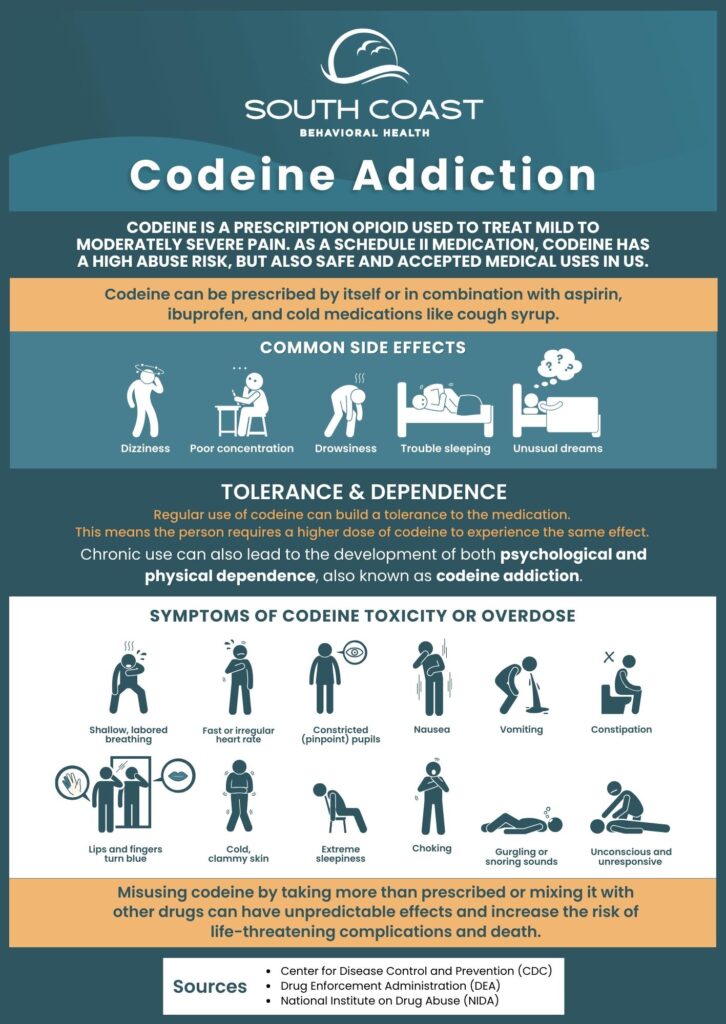Codeine Addiction
Codeine, a commonly prescribed opioid, is often used to manage pain or alleviate coughing. However, its potential for addiction and drug abuse cannot be underestimated.
When abused, this prescription opioid painkiller can lead to a slew of negative side effects and health complications. Codeine abuse can also result in addiction and dependence, impacting one’s physical health, mental well-being, and overall quality of life.
Understanding the nature of codeine addiction, its effects, and the treatment options available is crucial for those struggling with codeine abuse.

What Is Codeine Addiction?
Codeine is an opioid medication derived from the opium poppy plant, commonly prescribed to alleviate mild to moderate pain or as a cough suppressant. It falls into a broader category of drugs known as opioids, which have a potential for addiction due to their pain-relieving and euphoria-inducing properties.
Codeine is available in various forms, including:
- Tablets
- Capsules
- Syrups
While codeine can provide much-needed relief when used as directed by a healthcare professional, its misuse and abuse can lead to a host of problems. According to the National Survey on Drug Use and Health (NSDUH), in 2020, around 16 million people in the United States had misused prescription pain relievers, including codeine. What makes codeine particularly risky is that even when prescribed by a doctor, some individuals may develop a tolerance, seeking higher doses for the same pain relief or euphoric effects.
Consequently, this can lead to dependence, ultimately spiraling into full-blown codeine addiction, which can have devastating consequences on one’s health, relationships, and overall well-being. It’s essential to recognize the potential dangers of codeine and the importance of responsible use to avoid falling into the grip of addiction.
Why Is Codeine Dangerous?
Codeine is used as an analgesic, sedative, hypnotic, antinociceptive, and antiperistaltic. It is also often recommended for insomnia in tuberculosis patients due to constant coughing. The narcotic drug typically comes in tablet form and is the main ingredient in prescription-grade cough syrup. Tylenol 3, another common over-the-counter pain reliever, is codeine combined with acetaminophen.
Other slang terms and nicknames for codeine are as follows:
- Lean
- Syrup
- Sizzurp
- Purple Drank
- Dirty Sprite
- Coties
- Schoolboy
- T3
- Act
The effects of codeine can be harmful for several reasons, both physically and mentally, posing significant risks to those who misuse or become addicted to it such as:
- Physical Health: Prolonged use or abuse of codeine can lead to several health concerns, such as respiratory depression, constipation, dizziness, and sedation. In more severe cases, it may even result in overdose, characterized by life-threatening respiratory failure.
- Mental and Emotional Well-being: Codeine abuse can have a detrimental impact on mental health. It can lead to mood swings, increased anxiety, and even depression, as individuals may experience intense emotional lows when the drug wears off.
- Behavioral Issues: Codeine misuse often leads to changes in behavior. It can trigger irritability, agitation, and impaired judgment. The preoccupation with obtaining and using the drug can cause individuals to neglect their responsibilities, leading to difficulties in personal relationships, employment, and overall functioning.
- Risk of Addiction: Perhaps the most significant danger is the risk of developing an addiction. As individuals build tolerance to codeine, they may seek higher doses, increasing the likelihood of dependency. Codeine addiction can be extremely challenging to overcome and may require professional treatment.
It is crucial to be aware of these dangers and to use codeine only as directed by a healthcare provider to mitigate the risks associated with its use.
What Are the Signs and Symptoms of Codeine Addiction?
Signs and symptoms of codeine addiction can vary, but several common indicators may suggest a problem. These include:
- Increased Tolerance: Over time, individuals may require higher doses of codeine to achieve the same effects, indicating growing tolerance.
- Withdrawal Symptoms: When not using codeine, individuals may experience withdrawal symptoms like anxiety, restlessness, nausea, and muscle pain.
- Preoccupation with the Drug: People addicted to codeine often spend an inordinate amount of time obtaining, using, and recovering from its effects.
- Neglecting Responsibilities: Codeine addiction can lead to neglect of work, school, or family obligations.
- Social Withdrawal: Those addicted may withdraw from social activities and isolate themselves.
- Mood Swings: Codeine addiction can cause noticeable mood swings, ranging from euphoria while using to irritability between doses.
- Physical Changes: Slurred speech, lethargy, and noticeable drowsiness can be signs.
- Doctor Shopping: Seeking multiple healthcare providers to obtain codeine prescriptions.
- Engaging in Risky Behaviors: Addicted individuals may engage in risky behaviors to obtain codeine, such as stealing or illegal drug purchases.
- Health Issues: The prolonged use of codeine can lead to health issues such as constipation, gastrointestinal problems, and respiratory difficulties.
It’s important to remember that while these signs and symptoms may indicate a codeine addiction, a formal diagnosis and professional assessment by a healthcare provider are essential to confirm addiction and determine the appropriate treatment.
Codeine Addiction and Mental Health
Codeine addiction can be closely intertwined with mental health, creating a complex and challenging situation. Individuals struggling with mental health issues, such as anxiety or depression, may be more susceptible to codeine misuse as they seek relief from emotional distress. This connection is often referred to as a “dual diagnosis” or “co-occurring disorder.”
Dual diagnosis means that a person is simultaneously dealing with a substance use disorder, like codeine addiction, and a mental health disorder. These conditions can exacerbate each other, leading to a cycle of substance abuse to cope with mental health symptoms, which, in turn, can intensify the addiction.
The prevalence of co-occurring disorders is substantial, with estimates suggesting that around 8 million adults in the United States alone struggle with both a substance use disorder and a mental health disorder. However, only a fraction of them receive adequate treatment for both conditions.
When addressing codeine addiction, it’s vital to consider the associated mental health aspects to provide comprehensive care and improve the chances of successful recovery. Professional assessments and integrated treatment approaches that address both conditions simultaneously can be highly effective in helping individuals achieve lasting recovery.
Wondering if Your Insurance Covers the Cost of Codeine Addiction Treatment?
When Do You Need Codeine Addiction Treatment?
Seeking codeine addiction treatment is crucial when an individual’s use of this medication becomes problematic and begins to impact their life negatively. Here are some signs that it’s time to consider treatment:
- Loss of Control: When you find it increasingly difficult to manage or stop your codeine use, even if you want to.
- Craving and Dependency: Experiencing intense cravings for codeine and feeling like you need it to function normally.
- Health Issues: Developing physical or mental health problems related to codeine use, such as gastrointestinal issues, depression, or anxiety.
- Neglecting Responsibilities: Failing to meet your obligations at work, school, or home due to codeine use.
- Relationship Strain: Experiencing conflicts and problems in your relationships with friends and family because of codeine use.
- Social Isolation: Withdrawing from social activities and interests you previously enjoyed.
- Legal or Financial Problems: Facing legal issues or financial strain due to codeine use or obtaining the drug.
- Withdrawal Symptoms: Experiencing withdrawal symptoms when not using codeine.
If you or someone you know is exhibiting these signs, seeking professional help for codeine addiction is vital. Addiction treatment can provide the support and strategies necessary to overcome codeine dependency and rebuild a healthier, drug-free life.
Codeine Addiction Treatment Options
Codeine addiction treatment encompasses a range of approaches to address both the physical and psychological aspects of addiction. Some common treatment options include:

Codeine addiction treatment begins with a thorough assessment by a healthcare professional to determine the severity of the addiction and identify any co-occurring mental health disorders. This assessment guides the development of a client’s individualized treatment plan.
The first step often involves a medically supervised detox to safely manage withdrawal symptoms and remove codeine from the body.
Inpatient programs for codeine addiction help people in the early stages of recovery. Inpatient care offers round-the-clock supervision, personalized treatment plans, effective medication management, evidence-based therapies, addiction education, peer-led support groups, and holistic treatments. These comprehensive programs empower clients to uncover the root causes of their addiction and cultivate healthier coping strategies for long-term recovery.
Medication-assisted treatment (MAT) for codeine addiction can incorporate medication for opioid use disorders (MOUD) such as methadone, buprenorphine, or naltrexone. MAT can assist in the management of cravings and withdrawal symptoms, allowing individuals to focus on recovery.
Dual-diagnosis treatment services address the symptoms of codeine addiction and any co-occurring mental health disorders. Treatment for co-occurring disorders often involves a combination of medication management and psychotherapy.
Complementary therapies like acupuncture, yoga, mindfulness meditation, and nutrition counseling can be beneficial in promoting overall well-being and reducing stress.
Group therapy, recovery meetings, and 12-step programs like NA provide a safe environment for substance abusers to share their stories and find support from individuals who have experienced drug abuse.
Codeine addiction treatment can be tailored to an individual’s specific needs, and a combination of these approaches often provides the most effective support on the path to recovery.
Codeine Addiction Treatment at South Coast Behavioral Health
At South Coast Behavioral Health (SCBH), our comprehensive approach to codeine addiction treatment involves a continuum of care, ensuring that individuals receive the appropriate level of support at each stage of their recovery journey.
Our codeine addiction treatment programs include:
- Medical Detox Program: The process begins with a medically supervised detox to safely manage withdrawal symptoms. Our expert medical staff ensures a comfortable transition into the next phase of treatment.
- Residential Treatment Program: For those requiring intensive care and a structured environment, our inpatient program offers a supportive setting for detox and initial recovery, with 24/7 monitoring.
- Partial Hospitalization Program (PHP): PHP offers structured day programs with comprehensive therapy and support, allowing clients to return home in the evenings.
- Intensive Outpatient Program (IOP): Our IOP program provides flexibility for those transitioning back into daily life, offering therapy and support on a part-time basis.
Our clinical approach emphasizes a personalized, evidence-based approach to codeine addiction treatment, incorporating various therapeutic techniques and addressing any co-occurring mental health concerns. Our skilled and compassionate staff is committed to helping individuals achieve long-term recovery and improved overall wellbeing.
If you or a loved one is struggling with codeine addiction, contact us today for support and guidance. Your mental health matters and recovery is possible.
Get A Confidential Assessment From A Recovery Specialist
Codeine Addiction Treatment in Orange County, CA
At South Coast Behavioral Health, our commitment is to help individuals struggling with codeine addiction achieve lasting sobriety and improved overall well-being. That is why each of our addiction treatment centers in Orange County, California provides the tools, support, and guidance needed to successfully navigate your journey to recovery.
Our center provides codeine addiction treatment for men within our medical detox and residential treatment centers in Irvine, CA.
We offer codeine addiction treatment for women at our medical detox and residential treatment centers in Huntington Beach, CA.
Our center offers codeine addiction treatment for men within our residential inpatient facility in Costa Mesa, CA.
We provide codeine addiction treatment during our PHP and IOP programs in Newport Beach, CA.
If you or a loved one is in need of treatment for codeine addiction, or are struggling with other substances, South Coasts offers a variety of treatment options to help you heal. Contact us today to start your journey to recovery.



